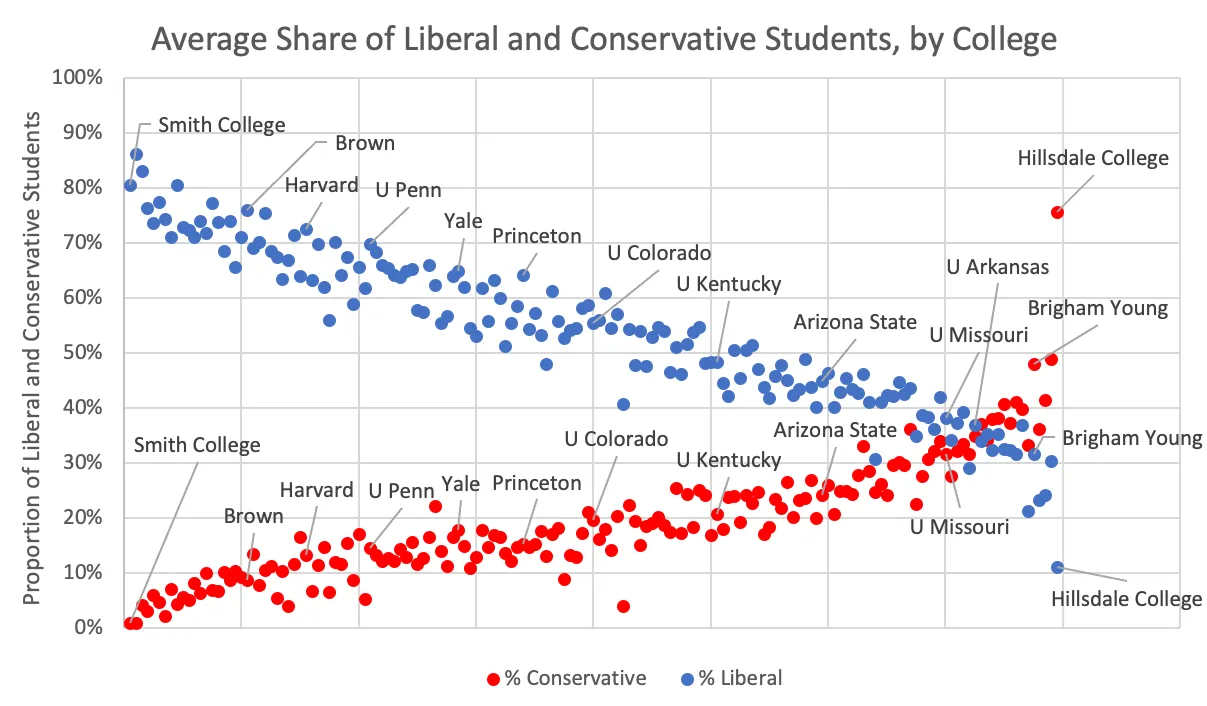A century ago, Left-modernist intellectuals like Floyd Dell depicted the small midwestern towns where many of them came from as narrow-minded puritanical hellholes which they escaped for the delights of Greenwich Village, New York and a few other select bohemian urban enclaves. In Sinclair Lewis’s Main Street (1920), which became a runaway bestseller, the main character Carol Kennicott expresses her revulsion at the “flavourless” Americanism of the fictitious town of Gopher Prairie, Minnesota. “I am sick with the Village Virus,” she complains. “Please tell me what people are doing and saying in New York.”
Today, those with inquiring minds may wish to move in the other direction.
Why? Because it is now in the reddest of heartland states that universities with high viewpoint diversity still exist. Here intellectual debate is more likely to flourish, free of pressure from intolerant peers and institutions.
The Foundation for Individual Rights in Education (FIRE) campus surveys now contain nearly 100,000 individuals, creating a wealth of information on the demographics and politics of American students in the leading 150 research universities in the country. These are the research powerhouses that educate the top 15% of the nation’s undergraduates, the future elite who will be the country’s opinion formers.
A new report for the Center for the Study of Partisanship and Ideology (CSPI), Diverse and Divided: a Political Demography of American Elite Students, contains an online table of Viewpoint Diversity rankings based on aggregated survey data, allowing the user to sort colleges by their ideological and partisan composition.
As the graph above shows, the highest viewpoint diversity — that is, the most even mix of liberal and conservative, Democratic and Republican — students, is in major red state universities like the University of Arkansas or Utah State.

It is curious that the wheel of cultural freedom has turned full circle, from the coasts to the hinterland, from progressive to conservative institutions. This speaks to the spectacular rise of Left-modernism. This ideology began as a counterculture between 1912, when the Young Intellectuals coalesced in Greenwich Village, and the mid 1960s. In the late 60s, identity Leftism replaced cultural modernism as the dominant thrust within Left-modernism. Rising to become an ascendant culture in academia by the late 1980s, Left-modernism crossed the threshold to emerge as the campus orthodoxy in the 2010s.
One example of this censorious new climate is the dramatically higher rate of cancellation campaigns — documented here — targeting academics such as Joshua Katz of Princeton, who was fired after he criticised a black radical student group in the wake of the George Floyd killing. Another is the growing plague of mandatory diversity statements which serve as ideological litmus tests to weed out job or membership applicants who are insufficiently committed to the ideas of the new cultural elite.
The rot is deep: these illiberal political oaths are supported by nearly 6 in 10 elite academics in the humanities and social sciences. Meanwhile, British students strongly prioritise protection from speech over the right to speech and 7 in 10 of their US equivalents think an academic who offends students should be reported to the administration.
If Lewis were to ink Main Street today, Carol Kennicott would be cast as a self-censoring student chafing against the Village Virus of Oberlin and asking ‘what are they saying in Arkansas?’











Join the discussion
Join like minded readers that support our journalism by becoming a paid subscriber
To join the discussion in the comments, become a paid subscriber.
Join like minded readers that support our journalism, read unlimited articles and enjoy other subscriber-only benefits.
Subscribe